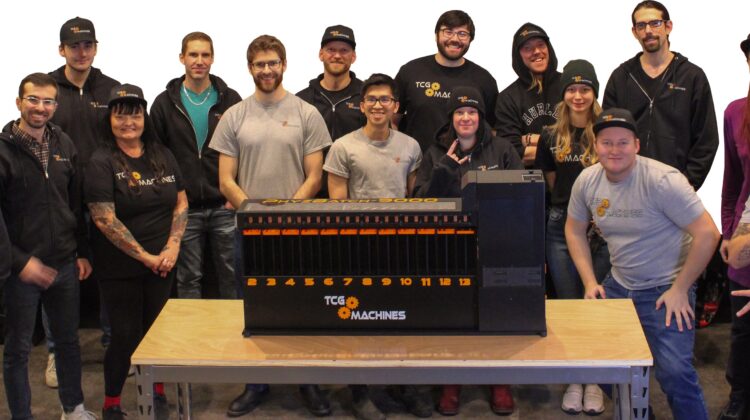
A good-natured quip in 2015 sparked an idea that may revolutionize the way collectible card enthusiasts, hobbyists, and game store owners manage their inventories.
TCG Machines, a Calgary-based tech startup, has been a relentless pursuit for entrepreneur Graeme Gordon, a mechanical engineer by profession.
A tiring three-day endeavour to sort his collection of Magic cards spurred his roommate to humorously suggest that they build a machine to ease the process. He took the joke seriously.
In 2016 Gordon made a full-time switch, quitting his day job to pursue his passion, supported by his wife who shouldered everyday expenses.
TCG Machines envisions a future where local game stores are thriving hubs for card players and collectors. The company aims to reverse the trend of closing small-time game shops by providing technological tools that increase the efficiency of managing card inventories.
The startup does this, as one can gather from the name, via machinery.
The PhyzBatch-9000, TCG Machines’ flagship product, is a feat of engineering brilliance. It sorts trading cards at a speed of up to 60 cards per minute, and to date, has sorted over 89 million cards from the two most popular TCGs—Magic: The Gathering and Pokémon.
“Card condition is of critical importance in this industry,” Gordon explained to CBC Calgary digital journalist Boshika Gupta. “The difference between a million-dollar card and a $10,000 card might just be some surface wear or a torn corner.”
The company’s journey began with Gordon contacting 200 stores across Canada and the US, which revealed that 90% of the store owners would order such a machine if available. After multiple years of testing and perfecting the system via prototype, TCG Machines shipped out its first PhyzBatch-9000 in 2022.
The machine is equipped with a double-roller conveyor system ensuring the cards are handled gently, with patented foil detection technology and even an ability to run infamous “Pringle” cards that are curved out of shape. The PhyzBatch-9000’s input hopper can take on 1,750 cards at a time, allowing the staff to load it up and walk away, while the machine does its job with 99.9% accuracy.
However, despite its sophistication, the PhyzBatch-9000 is not designed to detect fake cards, a task often deemed too complex even for humans. The machines are also limited in that they need their software to be updated anytime new cards are released, as the AI can only analyze cards it already has a base set of data on.
TCG Machines’ software does have some tricks though, such as allowing users to set custom criteria to suit their business needs. The PhyzBatch-9000 can sort cards based on metrics like “Harvest Mode,” Rarity, Set, Name, Alphabetical, and Card Orientation, with specific presets for Magic and Pokémon cards.
Game shops such as Phoenix Comics may have more than one million cards to sort through and manage, according to comic store owner Brian Ziemba, who helped Gordon with his prototyping.
“The machine doesn’t make any mistakes,” Ziemba informed Gupta of the PhyzBatch-9000.
The startup is a seven-year-long overnight success.
“It’s hard to believe that two short years ago TCG Machines had no commercial facility, no employees,” Gordon wrote on his company blog earlier this year. “Fast forward to today: we have a dedicated production space, an amazing (and rapidly growing) staff, and scores of machines operating all across North America . . . it’s pretty amazing to see how far we’ve come.”
The company’s business model sees it lease the machines out to local game stores, charging a monthly fee. TCG Machines has shipped more than 100 PhyzBatch-9000 models to date.


Leave a Reply